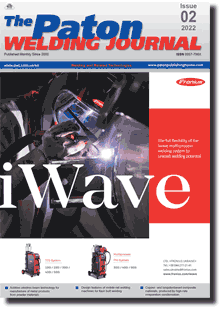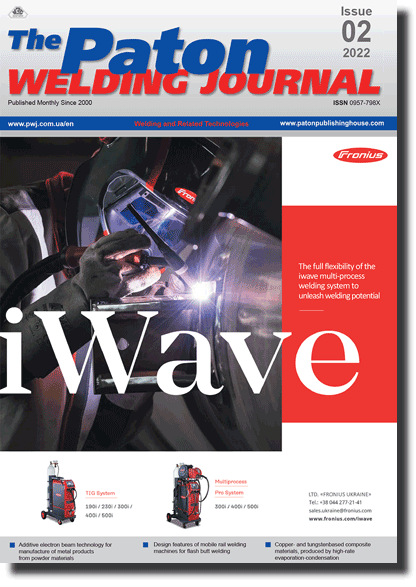Access for download PDF files for subscribers and for reviewers of scientometric bases.
Organization: Elsevier for content access(PDF files of journals released before 2024 are available for download from the website's archives))
Organization: Elsevier for content access(PDF files of journals released before 2024 are available for download from the website's archives))
| 2022 №02 (02) |
DOI of Article 10.37434/tpwj2022.02.03 |
2022 №02 (04) |

The Paton Welding Journal, 2022, #2, 16-25 pages
Additive electron beam technology for manufacture of metal products from powder materials
V.A. Matviichuk, V.M. Nesterenkov, O.M. Berdnikova
E.O. Paton Electric Welding Institute of the NASU. 11 Kazymyr Malevych Str., 03150, Kyiv, Ukraine. E-mail: nesterenkov@technobeam.com.ua
Abstract
The aim of the work is to create additive electron beam technology for layer-by-layer manufacture of metal parts from powder materials. To carry out investigations, an experimental model of additive equipment was made, a software and hardware platform for additive manufacturing was designed, technological methods and modes of printing products of a set shape with predicted strength properties were invented. Applying the additive method, 25 experimental samples for further tests were printed. For each of the products, the speed of beam movement, its power and dynamic focusing current were determined. The influence of basic parameters of the technological process of surfacing on the formation and features of the surface structure and chemical composition of the samples were studied. It was found that the chemical composition of products corresponds to the composition of raw materials except for the content of aluminium, which is underestimated by 0.6‒1.96 % relative to the chemical composition of the powder. To eliminate this drawback, it is necessary to maintain the aluminium content in titanium alloy powders at the highest level. According to the results of investigations in the created equipment, according to computer models, the products of industrial and medical purpose were printed, the printing modes of which are optimized. From the powders of titanium alloys, the models of stator blades of a gas turbine aircraft engine, human skull implant and bioprosthesis were manufactured.
Keywords: additive technologies; 3D printer, electron beam surfacing, metal powder, titanium alloy, chemical composition, surface microrelief
Received: 13.12.2021
Accepted: 31.03.2022
References
1. Nesterenkov, V.M., Matvejchuk, V.A., Rusynik, M.O. et al. (2017) Application of additive electron beam technologies for manufacture of parts of VT1-0 titanium alloy powders. The Paton Welding J., 3, 2-6. https://doi.org/10.15407/tpwj2017.03.012. Matviichuk, V.A., Nesterenkov, V.M. (2020) Additive electron beam equipment for layer-by-layer manufacture of metal products from powder materials. The Paton Welding J., 2, 41-46. https://doi.org/10.37434/as2020.02.08
3. Stolt, R., Heikkinen, T., Elgh, F. (2018) Integrating additive manufacturing in the design of aerospace components. In: Proc. of 25th Int. Conf. on Transdisciplinary Engineer- ing (TE2018) (Modena, Italy, July 2018). https://doi.org/10.3233/978-1-61499-898-3-145
4. Paria, Karimi (2018) Electron beam melting of alloy 718: Influence of process parameters on the microstructure. University West, Dept. of Engineering Sci. Division of Subtractive and Additive Manufacturing. Licentiate Thesis.
5. Günther, J., Brenne, F., Droste, M. et al. (2018) Design of novel materials for additive manufacturing: Isotropic microstructure and high defect tolerance. Sci. Rep., 8(1), 1298. https://doi.org/10.1038/s41598-018-19376-0
6. Vostrikov, A.V., Sukhov, D.I. (2016) Manufacture of granules by PREP method for additive technologies: Current status and prospects of development. Trudy VIAM, 8(44), 17-23 [in Russian].
7. Iliyushchenko, A.F. (2019) Additive technologies and powder metallurgy. Minsk, Medison [in Russian].
8. Powder Ti6Al4V ELI. Site: Sino-Euro Materials Technologies. https://en.c-semt.com/ti/09.12.2021
Suggested Citation
V.A. Matviichuk, V.M. Nesterenkov, O.M. Berdnikova (2022) Additive electron beam technology for manufacture of metal products from powder materials. The Paton Welding J., 02, 16-25.The cost of subscription/purchase order journals or individual articles
| Journal/Currency | Annual Set | 1 issue printed |
1 issue |
one article |
| TPWJ/USD | 384 $ | 32 $ | 26 $ | 13 $ |
| TPWJ/EUR | 348 € | 29 € | 24 € | 12 € |
| TPWJ/UAH | 7200 UAH | 600 UAH | 600 UAH | 280 UAH |
| AS/UAH | 1800 UAH | 300 UAH | 300 UAH | 150 UAH |
| AS/USD | 192 $ | 32 $ | 26 $ | 13 $ |
| AS/EUR | 180 € | 30 € | 25 € | 12 € |
| SEM/UAH | 1200 UAH | 300 UAH | 300 UAH | 150 UAH |
| SEM/USD | 128 $ | 32 $ | 26 $ | 13 $ |
| SEM/EUR | 120 € | 30 € | 25 € | 12 € |
| TDNK/UAH | 1200 UAH | 300 UAH | 300 UAH | 150 UAH |
| TDNK/USD | 128 $ | 32 $ | 26 $ | 13 $ |
| TDNK/EUR | 120 € | 30 € | 25 € | 15 € |
AS = «Automatic Welding» - 6 issues per year;
TPWJ = «PATON WELDING JOURNAL» - 12 issues per year;
SEM = «Electrometallurgy Today» - 4 issues per year;
TDNK = «Technical Diagnostics and Non-Destructive Testing» - 4 issues per year.


